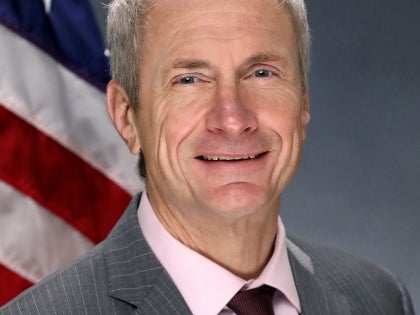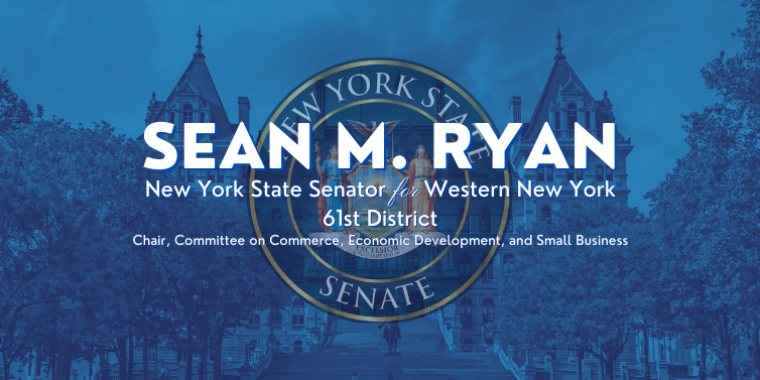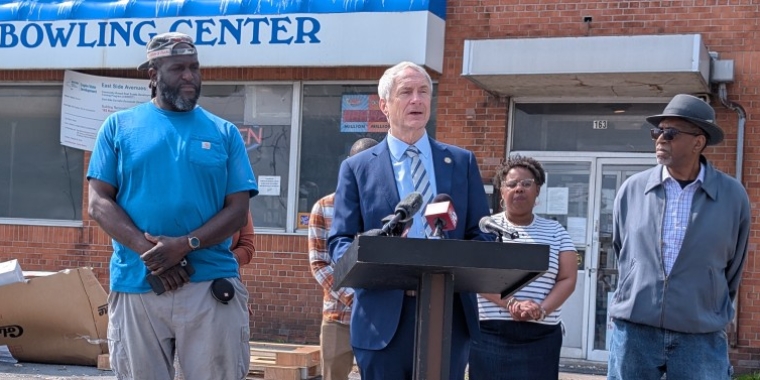
Senator Sean Ryan Secures Millions To Expand Housing Plan, Announces State Budget Highlights For Buffalo And Erie County
May 9, 2025

BUFFALO – Today, May 9, 2025, New York State Senator Sean Ryan announced details of the FY 2025-2026 state budget, which included major funding to expand three programs that make up Senator Ryan’s housing plan as well as significant funding for education, infrastructure, and public safety.
Senator Ryan has secured $80 million in the enacted budget to expand a trio of housing programs he proposed as part of The City of Good Neighborhoods, his plan to address the shortage of high-quality, affordable housing in Buffalo and across Upstate New York. All three programs were established in last year’s state budget and are currently active in communities throughout Upstate New York:
- $40 million to expand the Vacant Rental Program, which offers small, local, and responsible landlords grants of $50,000 or $75,000 to renovate uninhabitable, vacant units in exchange for a 10-year commitment to rent the units at affordable rates corresponding to each grant amount. Local program administrators are currently in the process of awarding funds from last year’s budget to local landlords, which is expected to create at least 90 affordable units in the City of Buffalo and over 150 in Erie and Niagara Counties.
- $30 million to expand the Block-by-Block Program, which supports small, concentrated, new construction infill projects of one and two-family homes on vacant lots in Buffalo and other Upstate cities by covering construction costs and subsidizing the sale of the new homes to low-to-moderate income New Yorkers.
- $10 million to expand the Shelter Arrears Eviction Forestallment (SAEF) Program, which reaches families in need of temporary rental assistance who are left behind by New York’s existing Emergency Assistance to Families (EAF) and Emergency Safety Net Assistance (ESNA) programs. The SAEF Program has already kept nearly 150 families facing eviction in their homes in Erie County alone.
Other highlights of the enacted budget:
Boosting Buffalo and Erie County
The budget invests heavily in the City of Buffalo, including an increase of $29 million for Buffalo Public Schools and a $5 million increase in Temporary Municipal Assistance (AIM) for the second consecutive year. It also includes Senator Ryan’s legislation (S.858) to extend expiring Gen. 1 Brownfield Cleanup Program tax credits at Renaissance Commerce Park in Lackawanna and $20 million in funding he worked to secure that will fund critical improvements to the Town of Tonawanda’s raw water supply system.
Prioritizing Affordability
The budget takes steps to make living in New York more affordable, including a tax cut for more than 75% of all tax filers in the state, saving the average taxpayer hundreds of dollars and bringing taxes for the middle class to their lowest level in 70 years. Additionally, inflation refund checks will provide direct payments of up to $400 to joint filers making up to $300,000 and single filers making up to $150,000.
It also includes several changes that will combine to reduce child poverty by an estimated 17.7%. That includes an expansion of New York’s child tax credit, doubling the size of the average credit families will receive and providing over 1.5 million families with an annual tax credit of up to $1,000 per child under age four and up to $500 per child from ages four through sixteen.
Repairing Roads
For the second year in a row, the Senate Majority secured a historic increase in Consolidated Local Street and Highway Improvement Program (CHIPS) funding in the enacted budget, with $100 million in additional funds added to the program over the next two years. CHIPS provides state funds to municipalities to support the construction and repair of highways, bridges, highway-railroad crossings, and other facilities that are not on the state highway system.
Investing in Childcare and Education
As childcare continues to be a key affordability issue for families across New York State, the budget includes $2.2 billion in state funding to improve access to affordable childcare and an additional $110 million to build or renovate child care centers in childcare deserts across the state.
It also provides full funding of Foundation Aid for New York’s school districts and includes $340 million to fund universal school meals for all New York students for the first time in the state’s history. The school districts in the 61st State Senate District received a $47 million increase in school aid from last year. It also includes $300 million for the SUNY system to fund research institutions and $160 million in capital funding for SUNY.
The budget also makes New York the 20th state to implement a policy to limit cell phone use in schools and the fourth to create a uniform statewide policy restricting their use during the school day. It also provides $13.5 million to cover school district costs associated with implementing the policy.
Backing Small Businesses
The budget includes $8 billion to clear unemployment insurance fund debt and eliminate the fees, taxes, and interest rates that small business owners pay every year toward the fund.
Supporting Law Enforcement and Public Safety
The Senate Majority also continued funding evidence-based violence reduction programs, including $22 million for SNUG, a program that reaches youth who are at high risk for involvement with gun violence, and $36.4 million for New York’s Gun Involved Violence Elimination (GIVE) program, which provides funding to local law enforcement agencies (including the Amherst, Buffalo, Cheektowaga, and Lackawanna police departments) for equipment, overtime, and personnel, and provides comprehensive, focused training and technical assistance to those agencies.
The budget also provides SUNY police officers, New York State forest rangers, and environmental conservation officers with a 20-year retirement plan, ensuring pension parity with their peers in other state law enforcement agencies.
It also includes reforms to streamline New York’s discovery laws and prevent cases from being thrown out over technical errors. The changes will maintain due process for defendants while making the system work better for victims and boosting public safety.
Ensuring Climate Resilience
The budget invests $1 billion in the Sustainable Futures Program to boost New York’s climate resilience and help the state transition to a less expensive clean energy economy. That includes $50 million for clean green schools, $250 million for zero emission vehicles and charging infrastructure, $200 million for renewable energy projects, and an investment of $200 million to create thermal networks at SUNY campuses including the University at Buffalo, a priority of Senator Ryan’s. The budget also doubles New York’s geothermal energy system tax credit to $10,000 and makes the credit refundable to make installing home geothermal systems much more affordable.
The budget also includes a record high Environmental Protection Fund of $425 million, a $25 million increase over previous years. This will help increase funding for waste management, protecting and preserving open space, and climate change mitigation and adaptation across New York State.
Integrating New Americans
In the wake of federal funding cuts, the budget provides $7 million for the New York State Enhanced Services to Refugees Program (NYSESRP) to ensure New York’s resettlement agencies can continue to provide support critical to integrating these new Americans into our society and our economy. Refugees are people who have legally come to America and they have contributed significantly to Buffalo’s first population growth in 70 years. Senator Ryan has been a longtime champion of NYSESRP and was instrumental in restoring proposed cuts to the program in this year’s budget.
